
Michele Reed
contributor to 14 posters
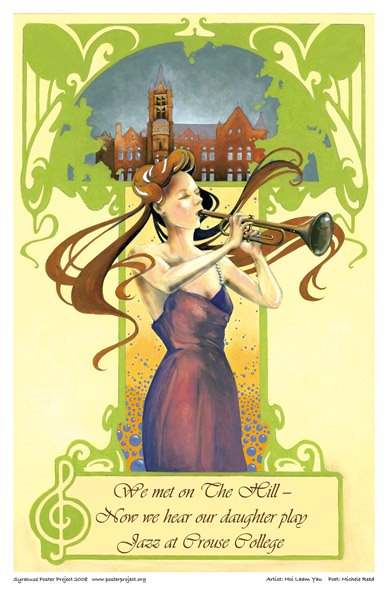
Poet
A lot of my poems end up being about my family, and this one is about my daughter, Katie. I should start at the beginning: My husband and I met as students at Syracuse University. When Katie was in high school, she went to a summer program at SU in jazz, and the final concert was in Setnor Auditorium in Crouse College.
She's a trombonist, and is now in graduate school studying trombone. It was just really cool for us to go to the Hill again to listen to our daughter play. Katie started with the trombone in fifth grade. She wanted to play the saxophone, but when she saw this big horn on display -- bigger than she was -- she said, "It's so beautiful. Can I take it home tonight?" Now, it's taking her all over the world.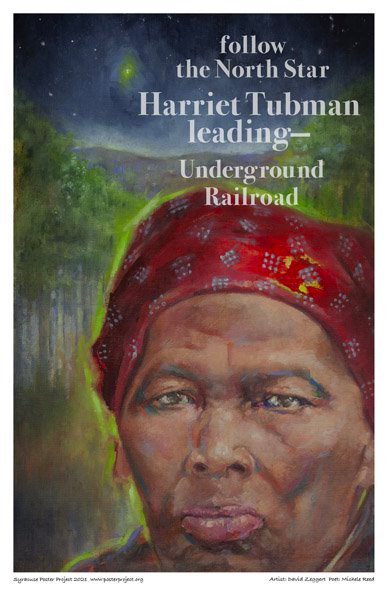
Poet
In the summer of 2020, America reckoned with issues of racism and injustice. So, when the call went out for poems about CNY's history, I thought of our area's legacy of social activism, from abolitionism to Women's Rights. And who better to embody that heritage than Harriet Tubman, conductor on the Underground Railroad and women's suffrage activist? Many area homes have “hidey-holes,” where enslaved people took cover on their way to Canada and freedom.
There is still much to be done to secure equality and justice for all people. But our local history proves that even one person of good will can make a difference.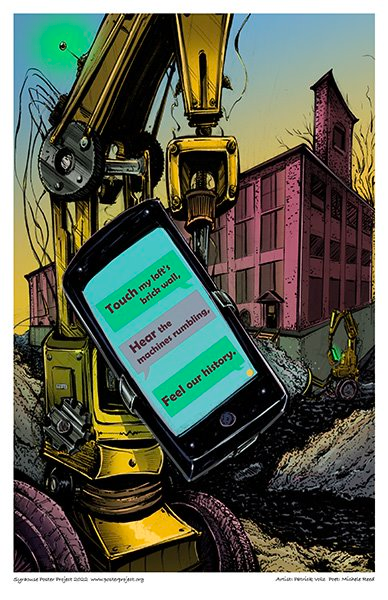
Poet
The building where I have my loft used to be the Standard Shipping Co. of Oswego, where 425 employees made four million pounds of yarn a year for factories around the world.
When I touch my brick wall, pass by the giant pulley in our lobby, or see a worker's name, “Lori”, on a beam in my kitchen, history comes alive.
The yarn made here is a literal thread linking generations from those 19th-century workers to us. I hope my poem evokes the spirit of pride in our historic architecture and the need to preserve it as a tactile link to our history.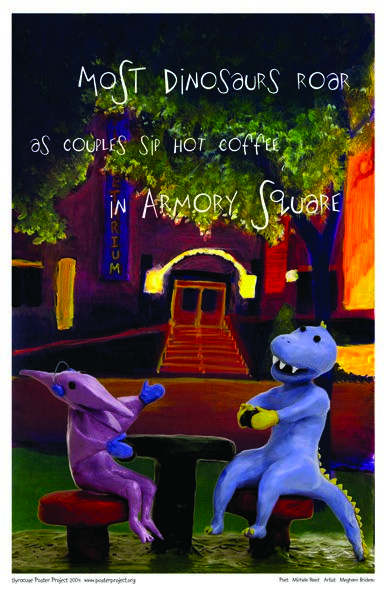
Poet
When my children were little, the MOST had a display of animated dinosaur models. So we went down there with the kids—Mike and Katie—and made a day out of it. They were probably 8 and 12 at the time. Anyway, it was somebody's birthday, and we went out for a celebratory birthday lunch.
The dinosaurs, while they weren't real, were roaring and lively. It was almost a psychedelic display. And then there was the more old-fashioned ambience of the square.
The kids enjoyed it so much that it became a family tradition—to visit the MOST, see the exhibits, and then wander around the square.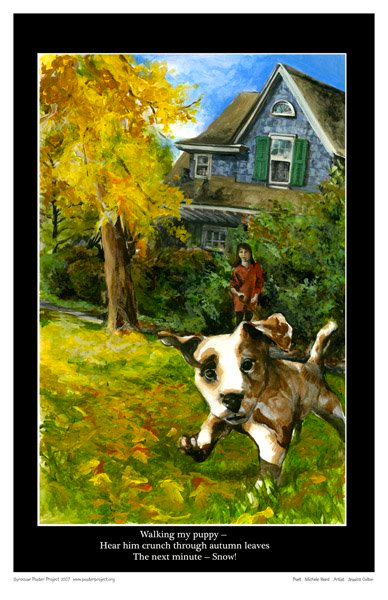
Poet
Our elderly dog had died in the spring, so we searched around until we found a pup, and by then it was Labor Day. So the pup was being house trained throughout the autumn. I would drive home on lunch hour and walk him under our beautiful black walnut tree, where he'd play in the crunchy leaves. We had the best times!
But because we live in Oswego County (think snow!), I knew that when winter came, our special lunches would end. And it really did happen that way: We were crunching under the black walnut tree, fetching sticks, and I turned around and saw snow in the air. In that moment, I knew: winter's going to come, puppy's going to grow up—live in the moment!
Poet
I like to write haiku while driving or riding in a car, especially over the rural roads near where I live. So the subjects of my poems are often flora and fauna seen through my car window. That's the case with this poem.
I remember riding along, admiring the daffodils that had sprung up along the roadside one early spring day, when up popped a little brown head. A woodchuck stood up on his hind legs and stared right back at the car, then remained there, just watching the traffic go by. For me it was the perfect example of how the natural world and the civilized world live side by side, just waiting for us to notice.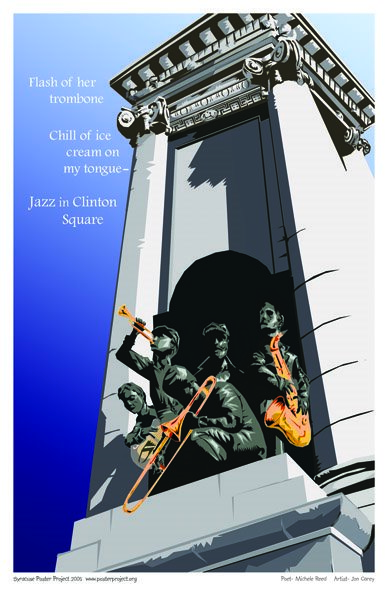
Poet
My daughter is a musician, a trombonist, and played with scholastic bands at Jazzfest and other festivals downtown. This poem is a distillation of those experiences: music in the open air, vendors selling food and drink—just a coming together of people in our city spaces.
And I think Syracuse is among a select group of cities, like Detroit and Montreal, that have successful jazz festivals. It's something special that Syracuse has and that we ought to celebrate.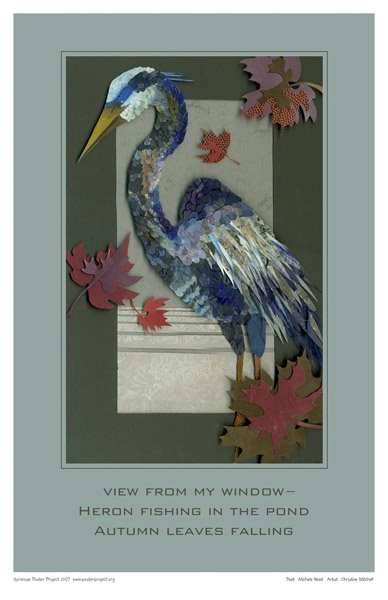
Poet
We live in the country, east of Oswego. To the north, we can see Lake Ontario, and to the south we can see our own pond, surrounded by poplar trees. Every so often, a heron visits, and it's wonderful and special when he does.
Our home is on land that was my husband's grandfather's farm, and the pond was a farm pond, used for watering cattle. There are wood ducks that live there, but I believe the heron has his nest in the woods, and comes out and fishes in the pond. I hope he's not catching the frogs that serenade us to sleep!
As the autumn leaves fall, I know the heron will fly away for winter. So there's a little bit of ironic regret in this haiku.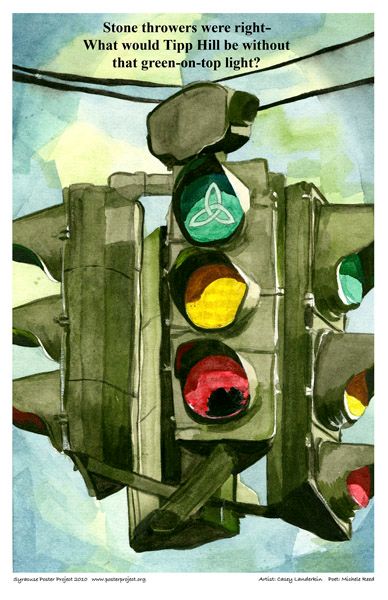
Poet
When traffic lights were first installed on Tipperary Hill, the proud Irish immigrant lads were offended to see the red of Britain above the green of Ireland and threw stones to break the lights. City officials soon tired of replacing the lights, only to have the boys break them again. So they installed the now-famous green-on-top traffic light.
I have heard it is the only one in the United State configured this way so I thought it was a part of our heritage that should be shared through the Poster Project, much the way the Stone Throwers Monument erected at the site shares the history with visitors.
I love to write haiku. Like meditation, it forces you to focus on the objective and reduce it to its simplest elements.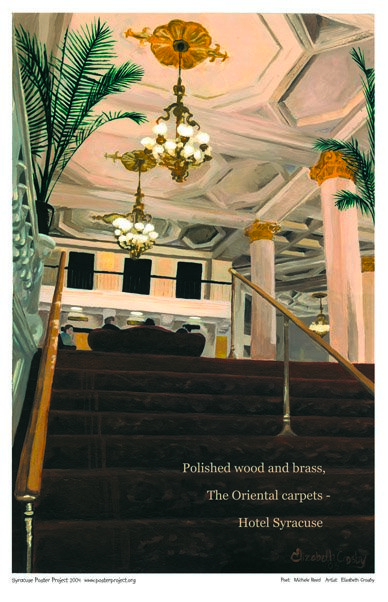
Poet
We stayed at the Hotel Syracuse last April, during the big ice storm. We live in the country, in Oswego County, and had no power or water, because of the storm.
Our daughter, Katie—a trombonist with the 315 All Stars—had a gig in Syracuse. So we booked a room at the hotel, so she could get ready. It was such a warm atmosphere—very hospitable!
And despite the adversity of the ice storm, it ended up being a kind of vacation. We went to the SU Final Four games at the Dome—along with thousands of excited, screaming fans. Sunday mass at the Cathedral, walking to dinner at The Mission. What could have been a hardship became a happy memory for our family!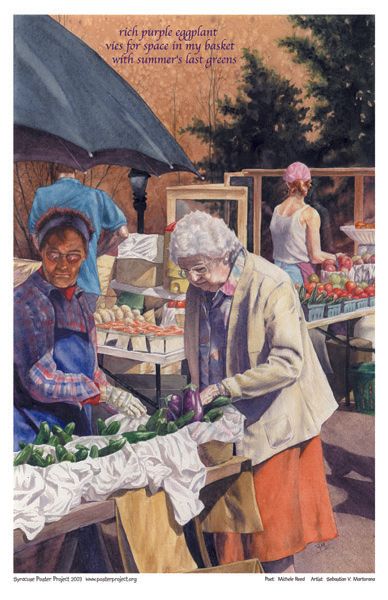
Poet
We live in Oswego, but we often come to Syracuse for my daughter's band rehearsals. She was rehearing one day, when my husband and I discovered the Regional Market. It was toward the end of summer, and the eggplants were phenomenal. We ended up with a basket of dark purple, light purple and white eggplant, summer's last greens, and a bunch of onions.
We went home and ended up with a really nice eggplant Parmesan salad. We were just amazed by the vegetables, and the freshness and beauty of them. It was like a feast for all the senses—different colors, textures, tastes and smells: garlic, onions, savory spices. It's a great resource for the whole area.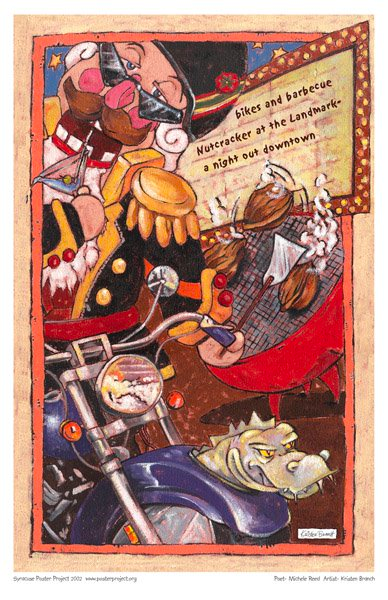
Poet
Haiku is one of the few things I write for myself. Everything else I write tends to be journalism—writing as the editor of SUNY Oswego's alumni magazine. So mostly I'm writing for other people and other purposes.
I write haiku while I'm riding in the car. I have a long drive to work. It's through the countryside around Oswego, so I see a lot of nature, and I think about that, or meditate about that. It's a way to relax.
I'm not from Syracuse, so for us to go to downtown Syracuse is usually an occasion. I've been the Landmark to see the Nutcracker with my daughter, and I've been to B.B. King, and concerts like that with my son. It's a special place.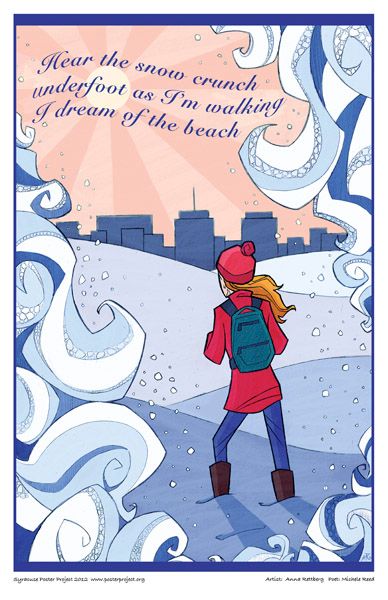
Poet
I love haiku for a number of reasons. I'm a journalist, an editor, and in a way, haiku is “just the facts.” It's what you see, smell, hear — without layers of interpretation on top of it. It's like meditation: it forces you to be centered, in the moment, and to fully concentrate on the experience.
I live in a rural area of Central New York. I walk my dog and drive to work on country roads. Being in nature is where I get peace and compose poems. I've lived here for 37 years, and last winter seemed like the longest and snowiest ever! I was walking my dog, and with each step I would hear this —cuh-RUNCH— of boots on snow. All I could do was dream of the Mediterranean — blue water and white sand!
Poet
I didn’t grow up in Central New York, but my late husband, Bill, did. I’ll never forget our first family trip to Heid’s, I don’t know who was more excited, Bill or the kids, as he shared with them—and me— the same special treat his father gave Bill and his siblings: Two Hofmann’s dogs with mustard, fries, and chocolate milk. In my haiku, I tried to capture the surprise of that first bite, the snap of the casing and the sense of carrying on a tradition for Central New York families since 1917.